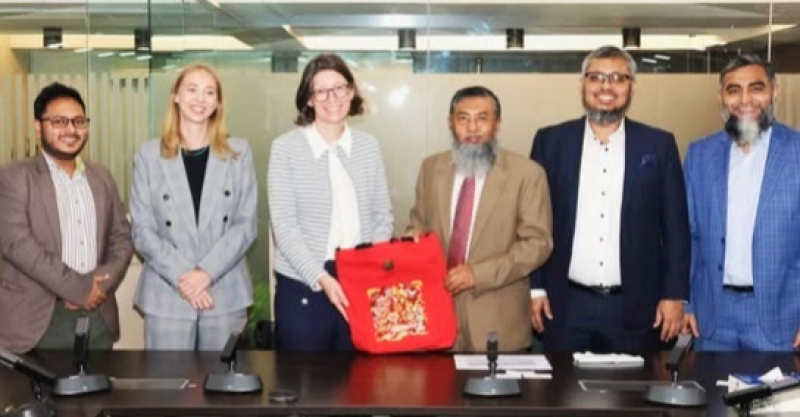- Bangladesh Faces $1.25 Billion Export Loss from US Tariffs |
- Israel Expands Gaza Assault as UN Warns of ‘Genocide’ |
- World Ozone Day Highlights Progress and Future Action |
- DG Health Services gives 12 directives to treat dengue cases |
- Stock market shows recovery as investors back: DSE chairman |
German Embassy, BKMEA discuss BD's post-LDC challenges

The Bangladesh Knitwear Manufacturers and Exporters Association (BKMEA) met with a German Embassy delegation on Monday (August 18) to discuss the implications of upcoming graduation from Least Developed Country (LDC) status.
The meeting, held at the BKMEA office in Dhaka, also covered market challenges, fair pricing, and Germany's new ‘Human Rights and Environmental Due Diligence (HRDDD) Act.’
The meeting was chaired by BKMEA President Mohammad Hatem, with Executive President Fazlee Shamim Ehsan and Director Rajiv Chowdhury also present. Representing the German Embassy were Anja Kersten, Deputy Head of Mission; Melanine Pfnner, Attachée; and Mehrab Bin Tarek, Economic Affairs Officer.
BKMEA President Mohammad Hatem expressed concerns that the country is not fully prepared for the transition, which is set to take place in November 2026. LDC graduation will result in the loss of the Generalized Scheme of Preferences (GSP) facility, under which Bangladesh currently exports a high volume of goods to the European Union (EU) duty-free.
Hatem urged the German Embassy to support if the Bangladesh government decides to seek a postponement of the graduation date.
He also raised concerns about the HRDDD Act, a German law that mandates companies to ensure human rights and environmental standards in their supply chains.
Hatem noted that while the law imposes binding obligations, buyers are often unwilling to pay fair prices that reflect the cost of compliance, leading to "unethical procurement practices."
Speaking on the HRDDD Act, Hatem noted that while the law is binding, buyers are unwilling to pay fair prices accordingly, leading to what he termed “unethical procurement practices.”
He requested the embassy’s assistance in ensuring fair pricing for Bangladeshi ready-made garment (RMG) products.
Addressing questions on US tariffs, BKMEA Executive President Fazlee Shamim Ehsan said the current arrangement remains satisfactory but called for its long-term sustainability, reports UNB.
He emphasized the importance of the Bangladesh government continuing active discussions on this matter.

